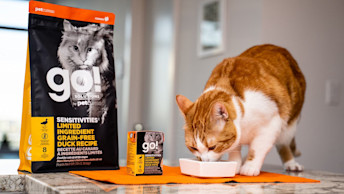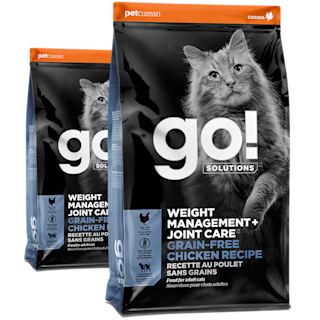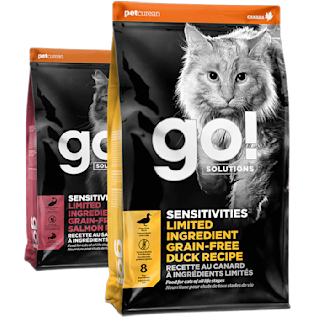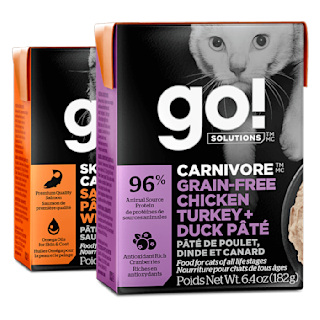February 2, 2021
What's the Best Cat Food for My Cat?

Choosing the best cat food is one of the most important decisions you'll make as a cat owner. The right food will keep your cat healthy and happy throughout their life - whether a kitten, adult or senior. But how do you decide?
Pet store aisles are filled with various foods ranging in texture, flavors, vitamins, and nutrients; the list goes on! We know just how overwhelming it can be when trying to choose the perfect food for your cat. To help you make the best choice, we've put together a guide on what to look out for and how to make the perfect decision when it comes to your furry feline.
Choosing the Best Cat Food for Your Cat
When choosing cat food, there are several factors to consider. These include:
1. Health and Weight
Does your cat have any health issues? Are they more on the overweight side? These are essential things to consider when choosing food that's best for your cat. If your cat needs to lose a few pounds, purchasing food proven to help manage weight is a great place to start.
Seeking advice from your veterinarian before switching up your cat's food is also recommended.

Recommended Solution
Healthy Weight Management Cat Food Solutions
Keeping your cat in great shape is key to a lifetime of playtime and purrs. With tasty lean proteins and functional ingredients like L-carnitine for healthy fat metabolism.
View Weight Management + Joint Care cat food
2. Life Stage
All cats need the proper nutrition to meet them at their specific stage in life, from kitten to senior. Make sure you pay close attention to the label and buy food that is for all life stages or specific to your cat's life stage.
3. Breed
No two cats are the same! Nowadays, you can easily find cat food made for specific breeds to tailor to their unique nutritional requirements. Some breeds of cats may do better with some food than others. Pet food companies consider factors such as kibble size for specific jaw shape, protein levels for activity levels, and even adding in more omega-3 fatty acids to help promote healthy bone and joint health.
4. Activity Level
Activity levels are another important factor to consider when choosing the best food for your cat. Just like humans, cats need a certain amount of daily nutrients and calories to function to their full potential. If you're overfeeding or underfeeding, this can have the opposite effect and lead to health issues.
5. Food Allergies or Sensitivities
Another important aspect to consider is whether your cat has any signs of food sensitivity, such as a dull coat, upset tummy, ear infections, or persistent scratching. These symptoms could indicate a possible adverse reaction to one or more of the ingredients in your cat's food.
It's important to determine this early on to eliminate any foods or ingredients that may be upsetting your cat's over health. A change in diet can support many health issues.

Recommended Solution
Expertly-Crafted Cat Food for Sensitive Stomachs
We understand how hard it is when your cat suffers from food allergies. These grain-free cat food recipes provide all the nutrition your cat needs, using as few key ingredients as possible.
View Sensitivities cat food
Consider Safety and Quality
The quality and safety of the food you select are very important. Select a brand that sets exceptionally high quality and safety standards for their ingredient suppliers and manufacturing facilities. A manufacturing facility that undergoes inspection by government officials and third-party auditors means that it meets very high sanitation standards, cleanliness and good manufacturing practices.
Government organizations that perform food safety inspections include the European Union (EU), the United States Food and Drug Administration (FDA), and the Canadian Food Inspection Agency (CFIA). Third-party certification by the British Retail Consortium (BRC) provides an extra verification level that the manufacturer meets strict quality control requirements.
You'll also want to find out who formulates the food to ensure that qualified pet nutritionists develop the recipes. Cats have unique nutrient requirements, so a qualified pet nutritionist will ensure to consider these when formulating a food designed specifically for cats.
Take a Look at the Ingredients
When it comes to ingredients, select foods that have their ingredients sourced from trusted partners as close to the manufacturing facility as possible. This ensures freshness and reduces the environmental impact from transportation.
Ingredients like fresh meats, whole grains, and fruits and vegetables provide essential nutrients, antioxidants and plant-based nutrients to support optimal health. Look for foods that are also naturally preserved.
Make the Best Choice
Sometimes personal preference comes into play when choosing a food for your pet. It’s important to come up with a diet that works well for your cat, all while giving them the proper nutrition they need. There are many recipes that use fresh meat, recipes that contain high protein meals, or organic and dehydrated meats.
Because cats are known to be fussy eaters, we recommended feeding different textures and flavours early on in their lives. Wet cat food recipes can be a bonus to help your cat get used to different tastes and textures, all while adding in more hydration. Cats are also known for limiting their water intake, so these kinds of recipes are always a great addition to meet their fluid requirements.

Recommended Solution
Healthy Wet Cat Food to Suit Your Cat's Needs
Made with high-quality animal proteins and antioxidant-rich cranberries for urinary tract support. If your cat has unique needs, allergies, or coat concerns, we have a wet food for that!
View wet cat food
In the end, choosing the best food for your cat may be trial and error until you find the perfect fit. However, once you find the right diet, it'll be well worth it! The right food will result in a happier and healthier cat and result in less frequent trips to the vet.



